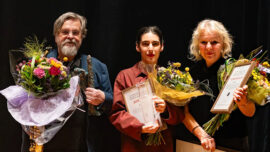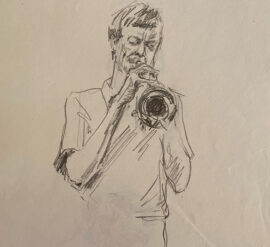
Intizar (إنتظار): Songs of Longing is the third collaboration of the Dutch Rembrandt Trio – pianist-organist Rembrandt Frerichs, violene-double bass player Tony Overwater and percussionist Vinsent Planjer, with an Iranian master; this time the trio pushed their musical boundaries with vocalist Mohammad Motamedi, a great singer of the classical Persian vocal tradition. Previous projects of the trio were with grandmasters like composer and tar player Hossein Alizadeh (Same Self, Same Silence, Just Listen, 2020, with whom Motamedi collaborates frequently) and composer and kamancheh and setar player Kayhan Kalhor (It’s still Autumn, Kepera, 2019).
Intizar (إنتظار) is used in Turkish, Farsi and Arabic and expresses hopeful anticipation. The offers songs that fit the more spiritual, traditional Persian repertoire, as well as a number of more worldly songs of Motamedi’s youth on which the Rembrandt Trio was expanded into a larger, chamber ensemble, with the addition of violin, cello and clarinet. The album was recorded before the recent uprisings in Iran. However, in retrospect, almost all of the lyrics Motamedi sang are directly or indirectly about the suffering of his beloved homeland and expresses hope and anticipation for a freer and more open society.
The interplay of Rembrandt Trio and Motamedi is totally natural. The jazz background and and extensive improvisation experience of the Dutch musicians fits the crucial role of improvisation in traditional Persian classical music. Motamedi’s approach to this project was unique. Upon hearing the trio’s first bars, he delved into his memory to find a spiritual poem out of the countless poems from the Persian canon, including poems Hafez, or a popular song that would fit the reserved, melancholic mood, while freely improvising on the trio’s music and being rhythmically guided by the pulse.
Intizar (إنتظار) was recorded at a church converted into a concert hall for (church) organs, with great acoustics, at the Orgelpark in Amsterdam. Frerichs played on two old fortepianos (from the time of Mozart), closer in their range to the Persian santur and the subtle, microtonal Persian music, and various organs. Overwater plays on the old violene, a forerunner of the double bass and an instrument close to the viola de gamba, and Planjer plays on a percussion set that he calls the Whisperkit. This unique instrumentation matches beautifully the expressive, emotional delivery and recitation of Motamedi (especially on «An Advice from Hafez») and senses the most delicate nuances in Motamedi’s singing, suggesting how supposedly faraway cultures and traditions can be intertwined and enrich each other.
Eyal Hareuveni
Mohammad Motamedi (vocals), Rembrandt Frerichs (Walter fortepiano from 1790, Erard fortepiano from 1889, organs), Tony Overwater (violone, double bass), Vinsent Planjer (percussion), Maya Fridman (cello), Maarten Ornstein (clarinet), Myrthe Helder (violin)



































